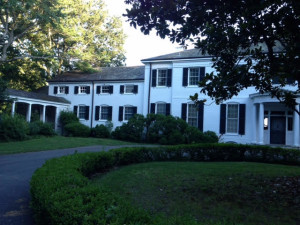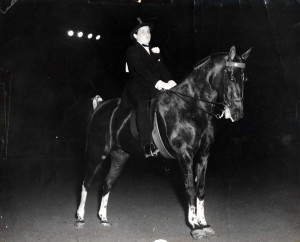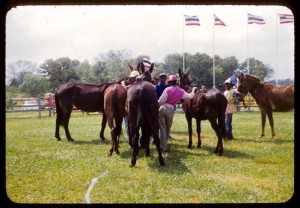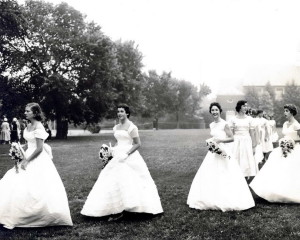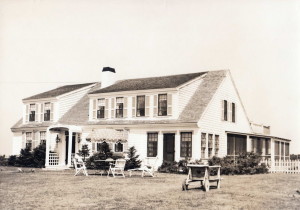Parents were the gods of well-behaved children in the 1940s in Memphis. I was born into a healthy, wealthy family who believed in hard work, respect, and staying out of the public eye. I knew thank you sir, yes mam and no sir before I got to the ABCs. Everyone was treated with respect from a child. Eventually I figured out if I had good manners, I could get in almost any door.
We lived among giant oaks, colorful dogwood trees and bucket sized magnolia blossoms. We were pure South, isolated from the things that needed contemplating but were not put on our plate to even know about when we were kids. In those days, nursery school and pre-kindergarten were not popular, because most mothers wouldn’t dare work. We learned the twists and turns of manners and proper behavior in the portals of our homes from our parents, and from the servants and nurses who were assigned to care for us. I being a girl, needed to know good manners and not technical savvy. I knew which fork to use but I could never keep the napkin in my lap. I knew how to keep my eyes down, but I toppled when I tried to curtsey. I went to ballet class but was too fat to be able to balance in a toe shoe.
I didn’t know much about anything outside my environs on South Parkway East. It was a “farm-et” – not a lot of land, but a big barn with two mules, two goats, a pony and strawberry fields for awhile, as well as peanut patch, yellow squash and tomatoes by the row. It was the old Broadnax mansion, Broadnax being the name of the top of the line jewelry store downtown on the corner of Main and Monroe. That was half a block from the building my grandfather owned that housed the offices of Federal Compress and Warehouse Co., close to the corner of Front Street where cotton puffs filled the street as cotton sampling and sales took place. Federal Compress my grandfather had begun on a shoe-string and having never gone to school, nor had shoes until he was twelve and needed them to work on the railroads, he counted on practical wisdom in the 1930ties. The environment in which I was brought up, made me who I was, too, at least when I first went to school, and set up how I’d get along, or not, with girls and boys I was allowed to play with. I actually became obsessed with shoes by the time I was a teen.
When I say I’m from Memphis, what is the image that you see, what is the image that I remember with my young eyes? We use odd tag lines, descriptive phrases, building up what my vision of Memphis was, knowing so little of it as a child. And of course we rarely said anything negative because we didn’t want that to impede what others thought of us, nor of where we lived. As far as the rest of the world, it wasn’t even in the imagination because we had no television, and only a noisy radio which tried to describe life in soap operas like Ma Perkins. I do remember learning about Paraguay and Uruguay in geography when we had to make a clay map of South America and also that China was on the other side of the world. But that was about it. I knew where we lived wasn’t cold or mountainous like Colorado nor hot with a beach like Florida, the two places we took vacations. Vacations meant packing up trunks and shipping them by train to our destination. My paternal grandfather owned a ranch in Woods Lake, Col., and my maternal grandmother wintered in Florida so that’s where we went when we could. My parents would take us out of school in wintertime to escape the snow for the trip to Palm Beach. Yes, we had to do homework with my strict father checking that we did. When I asked for help, he would say, “Read the problem. Do what the problem says.”
Cotton was Memphis’ gold in those days. Plantations in Mississippi , Alabama, and Arkansas harbored African American slaves. I as a child didn’t know what the Civil War or even history was, or plantations or slaves or even the river. I don’t remember ever being driven to see the Mississippi River. Nor did I know about the Chickasaw Indians or the Choctaw. I learned, later in life, that when the federal government purchased the land that is now considered the Delta, they opened it up in 1818 and pioneer families from Virginia and North Carolina came to settle the lands – the Leas, The Taylors, the Cheairs, the Crumps, the Wiggins, the Kings, and others, many of whom are honored in death in stained glass windows in St. Mary’s Episcopal Cathedral downtown on Poplar Avenue. Railroads were quick to Memphis because of the cotton trade, and I remember the Illinois Central and L&N tracks ran on a bluff back behind our house. We’d lay pennies on the rails to get them squashed. I loved the sounds a passing train let out for us.
In the ‘40ties, Memphis was the world’s largest spot cotton market (over 40 per cent of the nation’s crop was traded here) and my grandfather founded in 1930s Federal Compress and Warehouse Co which compressed and stored the cotton bales, 75 per cent of the cotton owned by the Federal Government. My city was also the largest mule market and I remember even at our mini-farm on South Parkway East, we had two mules which I was occasionally put upon for fotos. We also grew strawberries and peanuts behind the barn and in a stall there were two goats that could pull a small wooden wagon which we girls, who always wore dresses , could crawl in. And there was a Shetland pony named Penny, who could be hitched to a wicker carriage that could tote about a half dozen little kids, and was popular at my birthday parties. Giant cubes of ice from the iceman in the ice truck were brought to the icehouse almost daily. And the milkman came like clockwork so we always had glass bottles of fresh milk with thick cream at the top which my Daddy like to pour on his Raisin Bran cereal for breakfast.
We weren’t fancy folk. We were cotton people because my grandfather had been successful with the warehouses. We had to wear cotton, silk or wool, never synthetic fabrics, which were cheaper and becoming popular. We didn’t grow cotton. On our big farm in the country, we grew cows and a few horses. We were not plantation owners. We just had a real farm out a dozen miles out in the county called Shelby that did nothing but provide grass for the animals until the Hereford herd got pink eye in the ‘50ties and that ended that. But horses stayed and multiplied. I became an equestrian, for a while, after we moved there when my grandfather passed. Once a year I’d get to go to the mule races where the black men won silver dollars.I thought a silver dollar was the best treasure ever. We first saw them out west where they were made, and were associated with the cowboy life. I would have traded everything in those years to be a cowgirl. I liked the hat, the boots, the chaps and the saddle. My best friends were the horses.
I don’t recall much at the big gray stone mansion on South Parkway East, except I remember having to learn to play the piano, hiding in my grandmother’s rose garden and one Christmas night I heard Santa’s reindeer on the roof, but I do remember the night World War II ended, and I could hear people singing and shouting in the streets. I didn’t know what it meant, or what war was, other than we had restrictions on food, and curtains and shades had to be shut to keep the light inside at night. We had formal dinner every night served by our butler Willie, with an appetizer, some sort of protein, three vegetables and always dessert. That was the best part, that and Rosie’s homemade biscuits which Daddy loved, putting a thick pad of butter between the two sides and letting it soak warm. I know our childhood lives were controlled, and protected; we were sheltered from politics, the wars, from sex, (a word we never dared to utter), and reading a comic book like Superman or Archie and His Friends was about as risque as one could get. We lived a routine that continued in a reduced way when we moved temporarily into the manager’s house of the big farm. When we moved there after my grandfather died in 1945, my father had to get up in the dark. His orange juice was brought to him, then Raisin Bran Flakes with cream and he was out the door by 5:30 a.m. His office was way downtown near Front street above the river. It was about a half hour drive. it also made getting and coming from school a problem. We were picked up for school early in the morning by Daddy’s secretary, who drove us on her way to work. I went to Miss Hutchison’s School for Girls, my brother went to Presbyterian Day School for boys. In 1950 my Dad began to build his dream house on the farm in the classic colonial style overlooking the land and paradise.
In those days, Memphis was ruled by a man named Boss Crump, to whom we were distantly kin, as our families came from Virginia to the Mississippi-Memphis area when the Indian lands were opened up in the 1800s. Boss Crump was also grandpa to my best friend. We had Cotton Carnival every spring to celebrate the cotton cycle, and some of us got to ride down the Mississippi River on a barge while dressed in some sort of costume or fancy dress. Then ride on a float down Main Street in a parade although it was nothing like what people said about Mardi Gras in New Orleans. When we were 18, my best friend was Carnival Queen. I was Carnival Princess. I hated the whole thing. My father thought it was a waste of money.
Elvis was still in Tupelo when I was in kindergarten, not singing for all to wiggle by. Handy was writing the blues, but of course my brother and I didn’t even know what the blues were other than a color that boys wore. My favorite books were Pat the Bunny, later Nancy Drew mysteries, Richard Halliburton’s adventure books, and there was a cartoon comic book (I loved comic books) called Little Audrey who was a jokester. I never thought she was a lot like me, although some people thought so because we had the same name. I loved the movies, particularly Abbot and Costello and Bob Hope ones, and collecting movie star autographs, (Marilyn Monroe was my prize autograph and I still have that), which you could write the stars for, and when I got older, Saturday afternoons we really did go to Normal Theater on Highland to watch serials and eat popcorn. It was safe in those days and nearby was Memphis State College.
I was the largest girl in kindergarten class, too many buttered biscuits snuck clandestinely in the night from the kitchen. In the class picture in our tiny chairs, my kindergarten graduation cap was tilted. I spent a lot of time taking metabolism tests to see why I was fat. It wasn’t fun. I just liked biscuits and Rosy’s desserts. In those days, proper girls stayed back, silent, folded in on themselves, one hand holding the elbow of the other, unless you were loose, popular, really smart or getting pregnant before graduation. Those girls usually had early big bosoms, which the boys liked. So shielded early in life from what was really happening since we didn’t have a neighborhood, just farm next to farm, I’m surprised I had guts to go outside and break social barriers that weren’t socially acceptable. Although in the origin, my family dictated my roster of friends, who I’d see, talk to, do business with, when I noticed things were not the way they should be, I’d go outside the box, just like when I would get Thomas to stop at Hoppers General Store on the way home from school – a little Butterfinger was worth the insulting looks at school. I also preferred to hang out with country people at Germantown High School, a county school with country kind of people who were fun, co-ed, loved sports and to bop to rock n’ roll music that most parents quarantined from their children’s 45 stockpile. That was better than than trying to make the grade at my private girl’s school where i just didn’t fit in, even though I wore the bobby socks, loafers, and whirly skirts with cutout poodles and white blouses with collars pulled up. We wore sunglasses so no one knew we were looking at the boys.
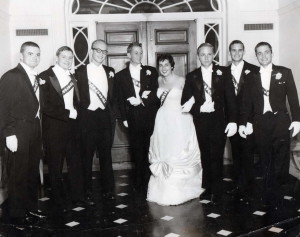 Big in growing up was being chosen for a sorority. There were high school sororities and the most socially prominent was Sigma Kappa Sigma. But many of my friends were in Phi Sigma. Night of bids was the wildest thing I had ever experienced. Phi Sigma girls hid me in their car but somehow, for some reason I’ll never know, I knew I had to chose SKS. It was my chance to be accepted at school. I was a good pledge but the Seniors didn’t pick on me too much. We carried cigar boxes full of candy and had to offer them to the seniors on sight. Colors were red and white. In those days we all swore to be virgins at marriage and there were secrets we learned when we became a true SKS which I have no remembrance of today. I knew no one would take the risk of getting pregnant, or if they did, it was curtains for them. It was such a special time. Since we lived so far away from school, my dad gave me on my 15th birthday, a yellow Chevy convertible and that made me popular, at last. With the radio blasting “work with me Annie” or “Annie had a baby”, we cooled it down Old Poplar Pike to Berreta’s at Park and Highland, or Fortune’s Jungle Garden, the first drive in in Memphis, and we’d hang out there swooning to “Pledging my Love, “ and watching the boys getting drunk on the other side of the barbecue pit.
Big in growing up was being chosen for a sorority. There were high school sororities and the most socially prominent was Sigma Kappa Sigma. But many of my friends were in Phi Sigma. Night of bids was the wildest thing I had ever experienced. Phi Sigma girls hid me in their car but somehow, for some reason I’ll never know, I knew I had to chose SKS. It was my chance to be accepted at school. I was a good pledge but the Seniors didn’t pick on me too much. We carried cigar boxes full of candy and had to offer them to the seniors on sight. Colors were red and white. In those days we all swore to be virgins at marriage and there were secrets we learned when we became a true SKS which I have no remembrance of today. I knew no one would take the risk of getting pregnant, or if they did, it was curtains for them. It was such a special time. Since we lived so far away from school, my dad gave me on my 15th birthday, a yellow Chevy convertible and that made me popular, at last. With the radio blasting “work with me Annie” or “Annie had a baby”, we cooled it down Old Poplar Pike to Berreta’s at Park and Highland, or Fortune’s Jungle Garden, the first drive in in Memphis, and we’d hang out there swooning to “Pledging my Love, “ and watching the boys getting drunk on the other side of the barbecue pit.
Church was something special, and was an obligation every Sunday, like it or not. My godmother made sure I got there. My father resigned from the church – but not from God – because it got to political, he said. Episcopalians in those days only celebrated the Eucharist once a month. I felt drawn but I would also get restless in the hard pews. My concept of God was that poor one of a blonde man with blue eyes whose stories we learned in Sunday School. That was until Rev. Tom Roberts took charge. He turned all of us into advocacy Christians, paying attention to the unfortunate, those treated unfairly, those with little hope. I had a white Bible, a gift from Confirmation, but we weren’t really supposed to read it and have opinions of our own. I remember sitting in the pews and dreading when the gospeler read from the Bible and then the man in the collar preached. I didn’t get most of what he said, unless Rev. Roberts was in the pulpit. Most speakers seemed to go on forever and we didn’t have the play options they now put in bags for kids to use so they don’t get restless in church. It always disturbed me that Jesus was blonde with blue eyes, as if we black haired peoples and people with dark skin didn’t matter. It also bothered me why none of my black playmates on the farm came to church. Things just didn’t feel right. And maybe still don’t. The only place where I was swamped with black parishioners was in Africa. In ‘50ties and ‘60ies, Catholics and Jews were questionable and not voted in as political leaders, not until John Kennedy was elected President. I didn’t understand why it made a difference what someone’s religion was, or what made whites and blacks separated from each other in just about everything from swimming pools to barbecue pits. I would leave any group of friends when the boys started calling our black people ugly names. Having been so close to the people who raised me, I knew I’d rather be around them than most of the white people I had to associate with no matter where I was.
As to the Kennedy family, Mother knew them from her youth on Cape Cod. They were neighbors but were not trusted socially, she explained, since the patriarch, though staunch Roman Catholics, was suspiciously friends of underground Mafia types. But my “aunt” was Catholic and I envied the way she crossed herself every time she passed a Catholic church. I began to copy her and still cross myself whenever I encounter something holy. I guess it helps. Remembering God. Episcopalians aren’t too far from the Roman Catholics, both being of the same apostolic vein. For some reason most people feared that Catholics had to consult God before making decisions about politics and war. I still do to this today. Isn’t our motto, “In God We Trust?” But best, I learned early on from my caretakers, “What a Friend we have in Jesus.” And I still believe it, no matter what anyone else claims.

